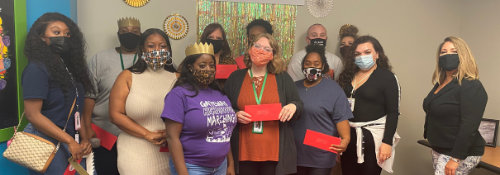
For years, the psychosocial program at PACES has been helping young people in Wyandotte County learn vital social skills including communication, empathy, impulse control and problem solving. These skills would prove to be critical for children and adults alike during the COVID-19 pandemic. But when COVID-19 forced a stay-at-home order to go into effect in Wyandotte County, the psychosocial program at PACES was briefly shut down.
When the stay-at-home order first went into effect in March 2020, an outside entity ruled that group and attendant care services could not be provided via telehealth. However, just a couple weeks later, that decision was reversed. When Britney Gladney, Supervisor for Psychosocial Services, got the call saying her team had been given the green light to return to work, she says her team was ready to hit the ground running.
“We’ve always been committed to the mission and the values that PACES stands for. The mission and values of creating hope, transforming lives, empowering families…it’s real and it sticks."
“We’ve always been committed to the mission and the values that PACES stands for. The mission and values of creating hope, transforming lives, empowering families…it’s real and it sticks. So when we got the call that we’re able to come back and do what we do best, there was no hesitation,” Gladney recalls. “Us knowing what we were each going through in the midst of the pandemic, just thinking about what our families were going through in the midst of the pandemic, we were so ready to get back to giving the kids that piece of normalcy that they were missing.”
The next day, Gladney says her team went back to work and gathered the supplies they would need to work with their kids virtually. Over the next few days, the team would take turns teaching group lessons to each other over Zoom to practice. By the following week, the team was back to providing services to children.
However, as with any major change, Gladney says there were some early hesitations.
“There was the reaction of ‘what is this? I’ve never had to do this before. I have no idea what I’m doing. I hope I’m doing it correctly.’ That was the initial response. But then we moved into ‘OK I got this. I can share videos. I can share my screen.’ It’s another way of teaching the skills that we’re wanting to teach.”
Providing psychosocial services via telehealth was a completely different experience for the team. Gladney says that moving a service that is all about socializing, sharing and interacting with one another to a virtual environment was difficult. Important lessons that can be taught through simple situations, like disputes over a certain crayon, were suddenly out of reach.
“Those basic opportunities to practice those skills were wiped away.”
Through all the difficulties and frustrations, Gladney says she is still grateful that her team had the opportunity to provide opportunities for kids to learn skills online. In May, the psychosocial program was able to resume in-person individual and group services with social distancing measures in place.
Gladney says she has noticed huge shifts in behaviors in the children as a result of the pandemic.
“Before the shutdown, there were a lot of our kiddos being disruptive or angry or defiant, but it was because they were in a space where they could express those emotions without being told not to feel that way,” Gladney says. “The kids were like ‘I was doing this, this and this and now I no longer have that and I’m sad and ashamed or upset that I was acting out in school or making it tough for my teachers because I genuinely like my teachers and want to see them every day. And now that I can’t see them, I regret those things that I had been doing.’”
Through all the ups and downs and the lessons learned over the past year, Gladney says she is extremely proud of how the psychosocial team responded.
“The staff’s resilience and their ability to move forward through the frustrations and uncertainties of the job itself shows a lot of belief in the program and their belief in the agency. It was very magical and beautiful to see. Our program is as strong as it is because of them.”
